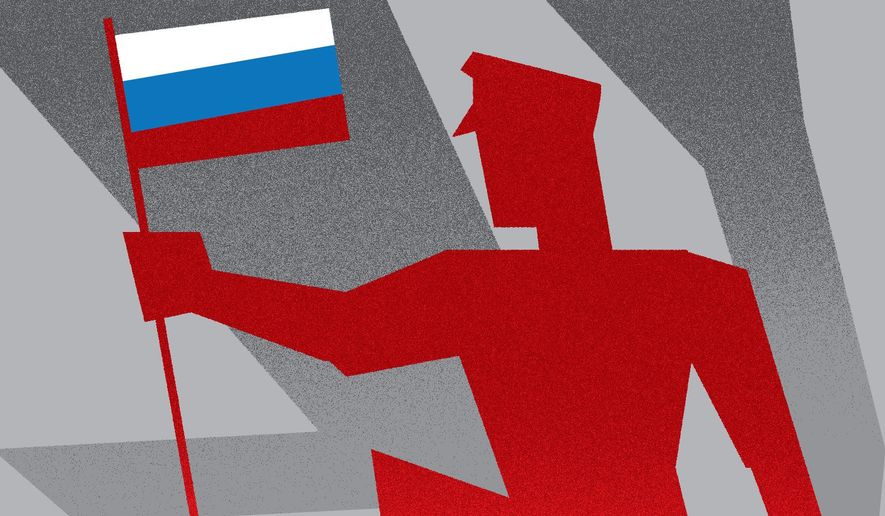Even when they shouldn’t, the media and most politicians ignore small wars, especially those that are stalemated. There has been a virtual news blackout on Russia’s revanchist war to conquer Ukraine. That war deserves greater attention, and Ukraine deserves increased support, because it is a struggle between freedom and slavery.
Russia’s war on Ukraine began in February 2014, when it seized the Crimean Peninsula from Ukraine. The “little green men” — Russian troops, in uniforms without Russian markings, and mercenaries — seized Crimea, forcing a sham election in which the Crimean people purportedly chose to become part of the Russian Federation. Weeks later, Russia formally annexed Crimea.
During that same February, violent anti-government protests resulted in Ukraine’s comprehensively corrupt president, Viktor Yanukovych (a favored ally of Russian President Vladimir Putin) fleeing to Russia. The leader of the Ukrainian parliament, Oleksandr Turchynov, was then chosen by parliament as interim president. He served as president until May, when Petro Poroshenko was inaugurated president. Mr. Turchynov then became secretary of Ukraine’s National Security and Defense Council, a cabinet post roughly equivalent to combining the U.S. posts of secretary of Defense and the secretary of Homeland Security.
By the end of February, heavy fighting had broken out between Russian forces — the “little green men” and Ukrainian separatists fighting for Russia — and Ukrainian forces. Peace agreements have been attempted — both Russia and Ukraine agreed to the Minsk I and II protocols — but neither resulted in a cessation of fighting.
Through translators and by email, I interviewed Mr. Turchynov as well as Arsen Avakov, the current secretary of Ukraine’s National Security and Defense Council. Each spoke forcefully about Russian aggression and resolutely in defense of Ukrainian freedom.
When the Russian attack began in February, Ukraine was at its weakest. As Mr. Turchynov pointed out, Ukraine lacked much military equipment, including good quality weapons. Ukraine’s stubborn fighters somehow stopped the Russian attack but only after it had penetrated far into the country. Quoting the late Golda Meir, Mr. Avakov explained how they stopped the Russians: “We had a secret weapon — the lack of an alternative.”
Today, according to Mr. Avakov, about 35,000 Russian troops, mercenaries and local separatists are operating in Ukraine’s Donetsk and Lugansk regions. He said that they are part of “… the Southern Military District of the Russian Federation Armed Forces.”
Mr. Turchynov said that Russia has another 87,000 troops on Ukraine’s borders ready to attack should a political decision be reached to do so.
Mr. Turchynov said, “The military aggression of the Russian Federation against Ukraine does not stop. There has not been a single day without military provocation against the defenders of Ukraine. Ukrainian positions are shelled using heavy weapons prohibited by the Minsk agreements. For instance, two civilians died and seventeen were wounded, including three children, as a result of the shelling in March of this year.”
Russia’s military aggression is not only on land. On Dec. 2, 2018, I described on this page Russia’s closure of the Kerch Strait which is the only outlet from the Sea of Azov to the Black Sea for two of Ukraine’s largest ports. Mr. Turchynov noted that the Kremlin is relentlessly employing cyber attacks against Ukrainian government systems and disinformation campaigns to interfere in Ukraine’s politics and elections.
Mr. Avakov said that Russian and separatist forces occupy about 15,000 square kilometers of eastern Ukraine and the entire Crimean Peninsula, which was part of Ukraine before Russia annexed it. He added, “This is not about square kilometers — it is about law, legislation and democratic values.” About 14,000 people have been killed, including more than 3,000 civilians. Two million others have been dispossessed.
The war is stalemated for several reasons. Mr. Putin apparently doesn’t want to risk serious economic sanctions that would result if Russian troops openly invaded Ukraine. Moreover, Mr. Putin lacks complete control of his Ukrainian proxy forces.
While Barack Obama was president, Ukraine was refused military aid and cooperation. Mr. Turchynov said he was told by American officials that the refusal was made “… in order to avoid irritating and provoking Mr. Putin.” According to Mr. Avakov, the military and diplomatic support given Ukraine by President Trump is quite significant in halting Russian aggression.
Ukraine’s current president, Volodymyr Zelensky, was elected in 2019 after a career as a television comedian. He is evidently frustrated by his own limitations. Earlier this year, he fired most of his cabinet and recently asked former Georgian President Mikheil Saakashvili to become a deputy prime minister to add his governing and diplomatic skills to Mr. Zelensky’s. It’s hard to see how Mr. Saakashvili can break the stalemate.
As Mr. Avakov told me, “Ukraine demands the full return of all its territories: temporarily occupied parts of Donetsk and Lugansk regions and annexed Crimea. [There must be] complete withdrawal of all Russian military formations from the territory of Ukraine … [and] the establishment of Ukrainian State jurisdiction in all occupied territories.” After that, he said, local elections can be held.
The COVID-19 pandemic and our November election have pushed all other news out of the media’s eye. Nevertheless, we cannot afford to ignore Russia’s continuing aggression against Ukraine. More attention must be paid by Mr. Trump, and more military and other support given, to Ukraine’s courageous stand for freedom.
• Jed Babbin, a deputy undersecretary of Defense in the George H.W. Bush administration, is the author of “In the Words of Our Enemies.”

No comments:
Post a Comment